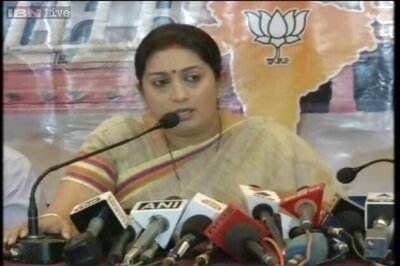
views
Anita Kanwal, Secretary of School Education, on Wednesday announced the major points in the new National Education Policy (NEP) 2020, at a press briefing attended by Secretary of Higher Education Amit Khare, HRD Minister Ramesh Pokhriyal, and Information and Broadcasting Minister Prakash Javadekar.
Proposing reforms in school curricula and pedagogy, the new policy stresses on holistic development of learners focused on acquiring key 21st-century skills and reduction in curricular content.
“The focus would be enhancing essential learning and critical thinking with emphasis on experiential learning. Students will have increased flexibility and choice of subjects. There will be no rigid separations between arts and sciences, between curricular and extra-curricular activities, between vocational and academic streams,” said a statement from the ministry.
A new and comprehensive National Curricular Framework for School Education, NCFSE 2020-21, will be developed by the NCERT.
NEP 2020 has introduced “Gender Inclusion Fund” and “Special Education Zones” to ensure education for the Socially and Economically Disadvantaged Groups (SEDGs), which include gender, socio-cultural, and geographical identities and disabilities. The students who are differently-abled will be helped to fully participate in the regular schooling process from the foundational stage to higher education.
The concept of daytime boarding school has been introduced in the NEP as per the ministry statement.
“Every state/district will be encouraged to establish 'Bal Bhavans' as a special daytime boarding school to participate in art-related, career-related, and play-related activities. Free school infrastructure can be used as Samajik Chetna Kendras," said the statement.
There is focus on 'Multilingualism and the power of language' -- according to this there will be emphasis on mother tongue/local language/regional language as the medium of instruction at least till Grade 5, and preferably till Grade 8 and beyond. Sanskrit will be offered at all levels of school and higher education as an option for students, including in the three-language formula. Other classical languages and literature of India will also be available as options. No language will be imposed on any student.
The new ways have been introduced to encourage participation in fun project/activity on ‘The Languages of India’, specifically for Grades 6-8, under existing schemes like ‘Ek Bharat Shrestha Bharat’ initiative. Students will be encouraged to learn several foreign languages at the secondary level. “Indian Sign Language (ISL) will be standardised across the country, and National and State curriculum materials developed, for use by students with hearing impairment,” said the statement.
Other new initiatives are for recognising foundational literacy and numeracy as an urgent and necessary prerequisite to learning. For this, the NEP 2020 has proposed setting up a National Mission on Foundational Literacy and Numeracy by the HRD Ministry. States are expected to prepare an implementation plan for attaining universal foundational literacy and numeracy in all primary schools for all learners by grade 3 by 2025.
The NEP 2020 has also proposed a National Book Promotion Policy to be formulated with push for digital libraries.




















Comments
0 comment